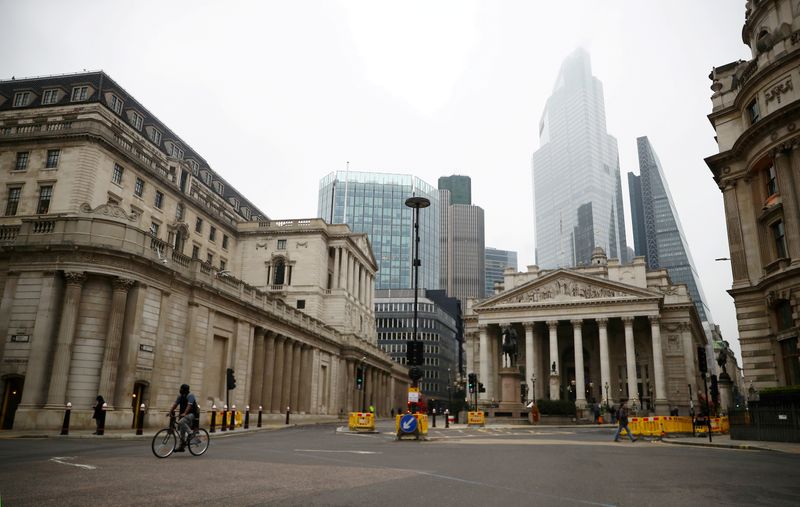By Huw Jones
LONDON (Reuters) - Britain's market watchdog is resisting calls for stricter rules on investment funds, putting the regulator at odds with the Bank of England which wants tighter controls to prevent them becoming a source of contagion in financial markets.
The BoE has said these funds may need stronger controls after the turmoil triggered by the coronavirus pandemic exposed their potential threat to financial stability because unlike banks they do not hold reserves of capital.
Britain's commercial property funds, for example, had to stop investors asking for their money back on a daily basis when extreme market volatility hit in March after economies entered lockdown.
Money market funds, a key source of short-term funding for companies, could have become a source of "contagion" during a COVID "dash for cash" had central banks not eased a liquidity crunch, the Bank of England said last month.
"How do we deal with the risks posed to financial stability by the structural tendency for money market and some other open-ended funds to be prone to runs, without having to commit scarce public money to costly support facilities?" the BoE said.
But Britain's Financial Conduct Authority does not want to rush to impose tighter rules because investment funds can be an important source of cash for companies coping with the crisis.
"We are still very much in the context of a continuing health crisis," Nausicaa Delfas, head of international at Britain's Financial Conduct Authority (FCA), told Reuters.
"It's important that we recognise that the non-bank sector is critical in enabling recapitalisation of companies to promote growth and recovery from the pandemic," Delfas said.
"This is definitely looking to the medium and longer term."
She said global and UK regulators are studying how the financial system operated during the early months of the crisis to see how banks, market infrastructure as well as non-banks functioned collectively under extreme stress.
The tension between central banks and securities watchdogs over regulating funds is not new, having surfaced in 2015 when the International Organization of Securities Commissions (IOSCO) torpedoed an attempt by the Financial Stability Board (FSB) to impose bank-like rules on big asset managers.
"The discussion has calmed down quite a lot since then and there is a recognition of the need to be fully informed," a financial market source said.
The FSB referred to an April statement which said that while the pandemic has highlighted potential vulnerabilities in non-banks, it was important to reap the benefits of the dynamic sector and apply existing recommendations.
The FSB will update on its thinking next week.
The BoE noted in a Financial Policy Committee statement in May that "underlying issues need to be addressed once the immediate problems have passed." The Bank has said it was in "close contact" with other authorities outside Britain.
An update on funds is expected on August 6 from the BoE.
But a senior funds industry official said Brexit and lack of global consensus on what should be done, leaves Britain with only limited room to reform a cross-border sector on its own beyond making a "noise."
LOCAL PROBLEM?
Some regulators have noted there has been no global run on funds to indicate a systemic problem, one financial market source said.
March market volatility pointed to problems in the commercial paper market - used for short-term financing - rather than with the money market funds themselves, the source added.
This source said that about 95% of fund assets suspended globally in the pandemic were in UK property funds and that was because of an inability to value assets in extreme conditions.
Before the crisis, the shuttering of a flagship UK open-ended equity fund run by then star stockpicker Neil Woodford had created a sense urgency in Britain for fund industry reform.
But fundamental reform of money market and other open-ended funds like Woodford's will be tough for Britain because 8,317 of 10,930 of those sold in the country come under European Union law, which Britain can no longer influence since Brexit.
And Britain's finance ministry has said that there are no viable UK alternatives to EU money market funds in the short or medium term.
"Any action on sterling money market funds in the UK will likely be in the form of additional requirements on EU money market funds being sold in the UK," said Sean Tuffy, head of market and regulatory intelligence at Citi Securities Services.
